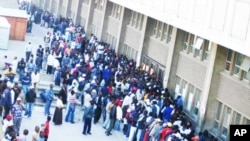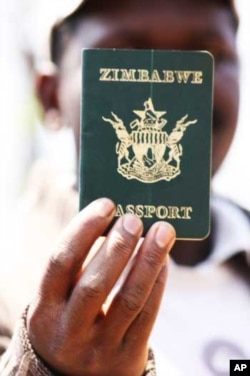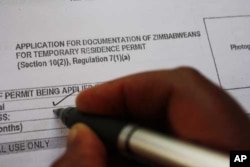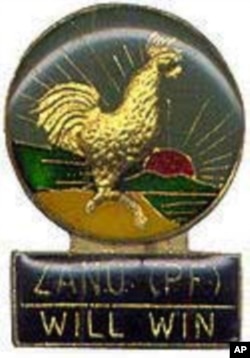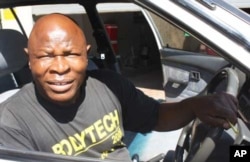Scowling men dressed in bright orange jumpsuits and gleaming black boots patrol the perimeter of the extensive show grounds in Pretoria, South Africa’s capital city. Struggling to make themselves heard above the noise of a police helicopter swooping overhead, the men bark instructions at a bunch of Zimbabwean migrants massed in front of a high steel fence. The security guards scream “Order! Order!” when an official unlocks the gate to allow a few more applicants in, sparking a surge by the crowd impatient to start a new life in Africa’s strongest economy.
The applicants are there to be “processed” at a South African Home Affairs office, according to new government immigration regulations pertaining to Zimbabweans. The International Organization for Migration says there are up to two million living illegally in South Africa. Some NGOs say the figure is far higher.
The Zimbabweans are in search of better lives, following sustained political and economic turmoil in their homeland. Now their host government is demanding that they be “regularized.” South Africa is allowing all “productive” Zimbabweans who are working or studying or who own businesses in the country to apply for new four-year residence permits.
If they don’t apply by December 31 or their applications are rejected, says South Africa’s chief of immigration services, Jackie McKay, the Zimbabweans – especially those deemed not to be contributing towards South Africa’s “development” – will be deported from early next year.
Zimbabweans ‘feel like animals’
But the new visa process is characterized by intense bureaucracy, corruption, confusion, and overcrowding. It’s a laborious, unfriendly process that’s leaving Zimbabweans frustrated and increasingly panic stricken as the application deadline looms.
In scenes similar to those playing out all over South Africa, Zimbabweans are slouched on a dirty sidewalk outside Pretoria’s Home Affairs office. Some women clutch whimpering babies; some people are caring for elderly and disabled individuals. Other applicants are ill, coughing and clutching at railings for support. During the day, those in the long queues sweat under a fiery summer sun, their eyes glassy from exhaustion. At night, they cover themselves with blankets, newspapers and sheets of plastic as buffers against the cold and curl up to sleep on concrete pavements.
“I have to sleep here; there’s nothing (else) I can do, because if I don’t, I won’t be served, even tomorrow. Because if I come (here) even five o’ clock (in the morning), (the security guards) will say (they are letting in) 100 only (per day), and we are many,” a Zimbabwean teacher working illegally in South Africa, Jendayi Nkomo, says. “(This new documentation process), it’s just a way of forcing us all to go back home. I don’t think they will serve all of us (by the end of the year).”
The South African government says it’s pouring more resources into making the application process more efficient. But Zimbabwean businessman Steven Ncube feels “humiliated” by his experience at the hands of Home Affairs officials.
“I never expected to be treated this way by the South African government. Look around you,” he says, pointing at people seated on the ground among empty packets and other litter at the Pretoria show grounds. “There are no toilets here. People just (defecate and urinate) right here in the street. If they go somewhere else, they could lose their place in the line. We feel like animals.”
Many Zimbabweans express deep loathing for the Home Affairs security guards. “At times they just force us back (shouting), ‘Get away from the gate!’ They push us,” Nkomo says. Another applicant says: “We are treated with nothing but disrespect. You have these young security guards pushing old women down to the ground.”
Yet another Zimbabwean adds, “They shout at us, ‘Go home and come back tomorrow!’ At least they could create some kind of order and give us numbers so we could keep our places in the queue, but there is no order.”
McKay says the application process needs “law” and that government security guards are well trained. “I am not aware of any abuses by Home Affairs security guards but if they are found guilty of any wrongdoing, they will be dealt with accordingly,” he maintains.
Bureaucracy and Bungles
Lawyer and head of the Zimbabwe Exiles Forum, Gabriel Shumba, says Zimbabweans are finding it “very difficult” to fulfill the bureaucratic requirements necessary to secure temporary legal residence in South Africa.
In order to apply for a work permit, for example, an applicant must present an affidavit from his or her employer stating that the applicant is employed by that person or company. Shumba explains, “This demand is presenting Zimbabweans working here with big problems. They go to the employer and they ask him for this letter. Then the boss refuses to give the letter. The boss thinks it is a trick by the government to find him and punish him for employing illegal Zimbabweans.”
To apply for a business permit, Zimbabweans must prove they’ve registered their businesses with the South African government and must prove they’ve paid taxes. Shumba says, “Most Zimbabwean businesses here are very informal so they will not have done all these things. But in any case, to get all these documents and still be in time to apply for the new permits will be a miracle.”
Many Zimbabweans are also complaining that Home Affairs officials are refusing to let them apply for the new permits because their passports indicate they entered South Africa after May 31, 2010. Only Zimbabweans who lived in South Africa before this date qualify for the new residence papers.
Sarah Khupe, a Zimbabwean waitress, says, “I have been living in Durban since 2004. I went to visit my family in Harare in July. Now when Home Affairs saw the entry stamp for when I came back in August, they said to me I can’t get this permit.”
Shumba describes this as “very unfair” and the type of “needless” bureaucracy that will see “many” Zimbabweans deported next year.
Other Zimbabweans say officials are demanding proof of residence from them – not a requirement in terms of the revised immigration law – before they’re allowed to apply for the new residence permits.
South African government: ‘We care!’
Home Affairs officials acknowledge there’s been a lot of confusion in their department about what is and what is not required in terms of the new law.
“Really, this Zimbabwean thing was just sprung on us and some people did not get the necessary training,” one says on condition of anonymity. But he’s adamant that “things are now improving and becoming more efficient.”
Jackie McKay insists, “What is happening with regard to this regularization project is in the best interests of Zimbabweans here and all South Africans.”
But Shumba says many Zimbabweans feel the South African authorities are treating them “very poorly” and are being “callous” in insisting on the December 31 deadline for applications.
McKay responds that the South African government is being “more than fair” to Zimbabwean migrants. “For our government to extend a hand to Zimbabweans that are illegally in our country, that have broken our laws, and say to them, ‘In spite of that, we will grant you amnesty from prosecution, and we will give you the correct documents to be legally in South Africa (if you conform to our requirements),’ shows a government that is quite the opposite of callous.”
‘Chaos’ at Zimbabwe consulate
At the Zimbabwe consulate in central Johannesburg, the challenges to the immigrants intensify. Massive crowds of Zimbabweans from all over South Africa are queuing to apply for passports. Without a valid travel document from their homeland, they will be refused the new South African residence permits and could be deported.
“We are all forced to sleep here. We must get the passports as soon as possible otherwise we will miss the deadline and be kicked out. I have been sleeping here for three days. I came here from Cape Town,” says Peter Hondo, an illegal immigrant, leaning against a lamppost in the busy street. “The officials can’t handle the demand. Up to now I’m still here and I don’t get any service. I’ve been told (by a Zimbabwean who applied earlier) there are only four or five (officials) who are taking care of (Zimbabweans applying) for passports,” he sighs.
But Zimbabwean consul general Chris Mapanga insists, “We have the situation under control, and we are reinforcing capacity as we go along, as the numbers (of applicants) grow….” He initially denied that people desperate for documents were sleeping in the street below the consulate because of his facility’s inefficiency in handling applications. But when pressed for a response to the large crowds that were clearly bedding down outside the consulate every night, Mapanga said, “If someone comes from very far away and they say they have nowhere else to go and so want to sleep outside, there is nothing we can do.”
Zimbabweans trying to get passports reject Mapanga’s explanations. “Where is all this ‘increased capacity’ that he talks about? Does this look ‘under control’ to you?” Charles Chawira asked, gesturing towards a queue of hundreds of people. He commented, “Soon we will not be able to apply for any work permits because our bosses will have fired us. I have left my job for four days now trying to apply for a passport and my boss is furious.”
Hondo says he’s “ashamed” of his government’s performance thus far in the new South African “regularization” process. “Sleeping in a place like this – dusty, filthy and next to the (refuse) bins, it’s something that makes you stooped very low,” he says. “But there is no sign at all of any sympathy from our government.”
Corruption
Instead of sympathy, says Braam Hanekom, who heads an NGO representing Zimbabwean migrants, passport seekers are confronted with corruption at the Zimbabwe consulate. “We have a lot of testimony from people who say they are unable to get passports unless they pay bribes,” he says.
Outside the Johannesburg consulate, passport applicants say Zimbabwe state officials are indeed demanding money from them in order to speed up their applications. “Nobody knows what is happening. (There are) no police; no one to inspect them; they just do it – at night,” says one.
Consul General Mapanga denies these allegations, saying, “If people’s names are in our database, and they have valid Zimbabwean IDs, they apply here at our office and Harare issues them with passports. All they have to do is fill in forms here. Why must they pay bribes in order to fill in forms?”
But Shumba says it’s “obvious” why applicants are “greasing palms…. If they don’t get passports as soon as possible, there’s a risk they will not be able to apply for the South African residence papers and will get deported after the 31 December cut-off date.”
Hanekom adds, “We’ve had reports of corruption in the queue where security guards are touting for bribes in order to get access (to the consulate) for the large numbers of people trying to apply for these passports.”
Mapanga dismisses this as a “big lie,” stating, “You are either in the queue or you are not in the queue. We serve everybody who is in the queue. You don’t need to bribe anybody to join a queue; a queue is open. You come in and you join the queue!”
Zimbabweans must ‘go home’
At six a.m. on a Thursday morning, Thomas Jongwe has followed Mapanga’s advice. He’s joined a queue already snaking around the consulate. Jongwe whispers that he once supported the Movement for Democratic Change in Zimbabwe but fled to South Africa in 2005 with his family when supporters of President Robert Mugabe “totally destroyed” his home in Harare.
“I can’t go back to Zimbabwe, not now. When I go back, they’ll catch me again,” he says, adding that if South Africa deports him, “I may as well be dead….”
But working class and unemployed South Africans, who blame Zimbabweans for “stealing” their jobs, have little compassion for the migrants.
“They must go home as soon as possible. They are causing big problems. Me, I have no time for Zimbabweans. They are putting big pressure on South Africa,” says Raymond Mbedzi, a deliveryman in Johannesburg. Like many South Africans, he claims jobless Zimbabweans are responsible for “too much” crime.
The deportations of Zimbabweans must happen “soonest,” Mbedzi stresses. “All those foreigners – all of them – every one must go back to his place. After that, this town can be clean, clean, clean,” he maintains.
When told of Mbedzi’s sentiments, Jongwe’s friend, Silver Chiyangwa, shakes his head, then says, “Well, that man, maybe he soon gets his wish. As far as I can see from this slow process, many, many Zimbabweans will be deported next year. Then we will see if all South Africa’s problems are solved….”
Some of the names in this report have been changed to protect identities.




